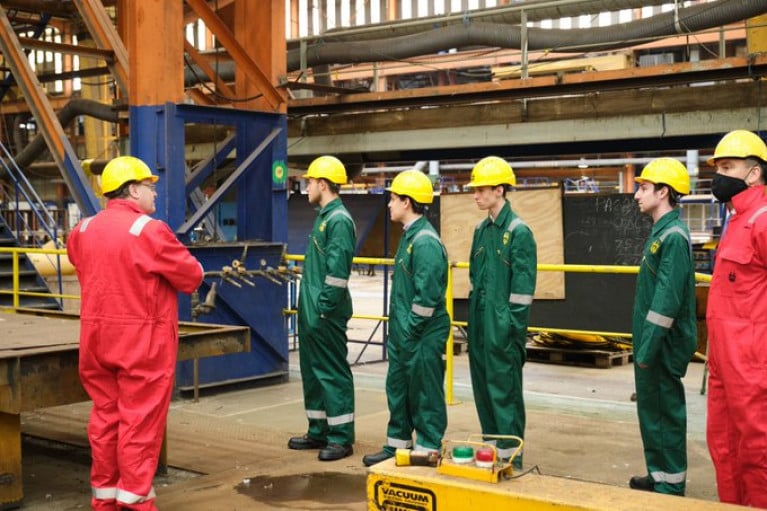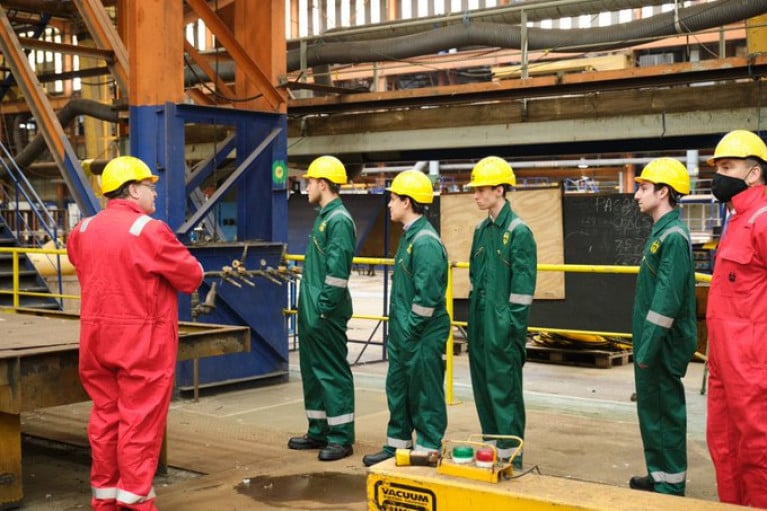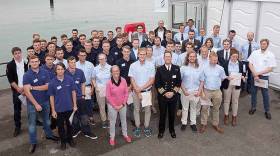Displaying items by tag: Apprentices
Shipyard Harland & Wolff has launched an apprenticeship scheme that is available across all of their four sites either side of the North Channel and the Irish Sea.
The scheme is applicable to H&W Appledore, Arnish, Belfast and Methil, with the first intake of apprentices arriving on site in September 2021.
Applications will close at 5pm 21 May 2021.
To apply, prospective employees must complete the application form which can be found under the Apprentices page on the Harland & Wolff website. At this time, CVs will not be considered.
For successful candidates, the next stage will include an online assessment followed by an assessment day and interview on site.
We will be looking for team players who are motivated with good communication and practical skills. Prospective apprentices must also have five GCSEs/Standard Grades/Nationals or equivalent including Maths, English, Technical, Craft.
Kelly O’Rourke, Group Director of Human Resources commented: “I am very excited to be launching our first Harland & Wolff multi-site apprenticeship scheme which will be a key aspect of our development into the future.
This scheme uniquely offers apprenticeships across all four Harland & Wolff sites and the opportunity to build a career in a number of industry areas. Our apprentices will work alongside our highly experienced workforce, transferring valuable skills to the next generation.
We are aiming to recruit from local communities, as well as those from a wide range of backgrounds and talents as we seek to develop a diverse workforce.”
Harland & Wolff has announced that it will soon be launching a new apprenticeship scheme at the 160 year old historic shipyard that last year notably signed a letter of intent to build ships again.
The scheme is set to officially launch later this year across both the flagship Belfast and the newly acquired Appledore sites, as Afloat reported. The Devon shipyard had up to 2018 built OPV's for the Naval Service.
Apprenticeships offered will be across three distinct functions, Trade, (welders, pipefitters, electricians, riggers, fabricators, etc) Technical, (engineers, naval architecture) and Business Support (sales, administration).
Highlights of the unique training programme will include practical on-the-job training, one to one mentoring alongside its experienced workforce, shipyard training facilities and the opportunity to earn while you learn.
As part of the scheme, apprentices will have the chance to experience working across Harland & Wolff’s five key sectors; cruise & ferries, defence, oil & gas, commercial and renewables, as well as across the full lifecycle of services it offers; technical services, building and fabrication, repair and maintenance, in service support, conversion, and decommissioning.
Prospective apprentices will be able to register their interest on the Harland & Wolff website here.
Harland & Wolff would also like to hear from any relevant apprentices who have been unable to complete their apprenticeship through the recent loss of employment.
Future Marine Workforce Celebrated at UK's Southampton Boat Show
Fifty eight young people have been honoured yesterday by British Marine, the membership organisation for the UK leisure, superyacht and small commercial marine industry, at its annual Graduation Ceremony at the 2016 Southampton Boat Show.
Now in its sixth year, the event celebrates a selection of graduating apprentices from all areas of the industry, in roles varying from marine engineers to shipwrights and joiners; recognising the diversity of skills and careers in the sector. Apprentices from eight member companies were recognised, from Berthon Boat Company, BHG Marine, Cooney Marine, RNLI, Seadub, Spinlock, Sunseeker International, Pendennis Shipyard and Princess Yachts.
The marine industry has over 470 apprentices across 100 businesses, with three quarters of apprenticeships in manufacturing and engineering, according to a new report* released at the Show yesterday.
Apprenticeships are important within the marine industry as an inability to recruit skilled workers is holding back business growth, according to the new report. 30% of companies have identified critical skills gap, with technical skills the biggest obstacle to recruitment. British Marine is working with its members to tackle the skills gap, turning to apprenticeships as well as providing a range of training and development opportunities for existing staff.
Sarah Dhanda, Director of Membership & Services at British Marine, said: “We are delighted to honour these 63 young people at our Graduation Ceremony. They are the workforce of the future and it is wonderful to be able to recognise their hard work and dedication. British Marine has been working with companies to support marine apprentices for a number of years to ensure that the industry, bringing £3.6 billion worth of turnover to the UK economy, addresses the skills gaps and continues to thrive.”
The Royal Navy’s Deputy Chief of Staff Engineering Support, Captain Matt Bolton, who presented the awards alongside Libby Greenhalgh of the Magenta Project, added: “A career in the marine industry offers a wide range of opportunities and an apprenticeship is an invaluable way to enter the sector. Thirty five years ago I started off my career as an apprentice and today I still draw on the knowledge and skills I learnt at the time. It is exciting to see so many young people taking on the oceans of opportunity within the industry.”


























































